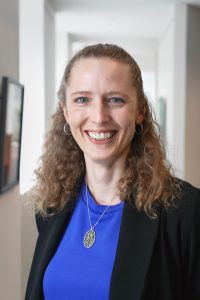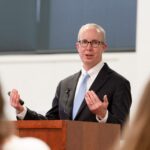Board of Directors
-
Laura Schmitt Olabisi Immediate Past President
 Dr. Laura Schmitt Olabisi is an Associate Professor in the Department of Community Sustainability and the Environmental Science and Policy Program at Michigan State University. She is an ecologist and a participatory systems modeler, working directly with stakeholders to build models that foster adaptive learning about the dynamics of coupled human-natural systems, and to integrate stakeholder knowledge with academic knowledge. She has worked in communities in Southeast Asia, West Africa, and the United States on a range of issues in agriculture, food and natural resources. Laura holds a doctoral degree in Systems Ecology from the State University of New York College of Environmental Science and Forestry, and a B.Sc. in Environmental Science from Brown University. She was a AAAS Leshner Leadership Institute Public Engagement Fellow in 2018-19, and is currently a board member of the Academy for Systems Change (formerly the Donella Meadows Institute), a non-profit organization dedicated to training systems leaders for sustainability transformations in the public, private, and nonprofit sectors (academyforchange.org). Laura served on the USSEE board from 2012-2016 and as conference chair for the USSEE meeting in 2017.
Dr. Laura Schmitt Olabisi is an Associate Professor in the Department of Community Sustainability and the Environmental Science and Policy Program at Michigan State University. She is an ecologist and a participatory systems modeler, working directly with stakeholders to build models that foster adaptive learning about the dynamics of coupled human-natural systems, and to integrate stakeholder knowledge with academic knowledge. She has worked in communities in Southeast Asia, West Africa, and the United States on a range of issues in agriculture, food and natural resources. Laura holds a doctoral degree in Systems Ecology from the State University of New York College of Environmental Science and Forestry, and a B.Sc. in Environmental Science from Brown University. She was a AAAS Leshner Leadership Institute Public Engagement Fellow in 2018-19, and is currently a board member of the Academy for Systems Change (formerly the Donella Meadows Institute), a non-profit organization dedicated to training systems leaders for sustainability transformations in the public, private, and nonprofit sectors (academyforchange.org). Laura served on the USSEE board from 2012-2016 and as conference chair for the USSEE meeting in 2017. -
John Polimeni President
 John Polimeni is an Associate Professor of Economics at the Albany College of Pharmacy and Health Sciences. He received his B.S. in Mathematics from Rensselaer Polytechnic Institute, a M.A. in Economics and a Certificate of Graduate Studies in Regulatory Economics from S.U.N.Y. at Albany, and a Ph.D. in Ecological Economics from Rensselaer Polytechnic Institute. He was awarded a Fulbright Senior Fellowship to Romania, where he is a Honorary Member of the Institute of Economic Forecasting in the National Institute of Economic Research in the Scientific Council of the Romanian Academy. He has received several research grants on his work in the area of economic development and the environment. John has published 60 peer-reviewed research articles, published four books, and eleven chapters in edited books. He has presented his research 81 times at international conferences with an additional eleven conference abstracts or posters. In addition, he serves or has served on 14 editorial boards of academic journals. John is a reviewer for the Romanian Fulbright Commission and serves as a reviewer for numerous academic journals. Lastly, John has been elected to two terms of the Schenectady (N.Y.) City Council and is a Fellow for the Elected Officials Protecting America – a group of policy-makers concerned about climate change and the environment.
John Polimeni is an Associate Professor of Economics at the Albany College of Pharmacy and Health Sciences. He received his B.S. in Mathematics from Rensselaer Polytechnic Institute, a M.A. in Economics and a Certificate of Graduate Studies in Regulatory Economics from S.U.N.Y. at Albany, and a Ph.D. in Ecological Economics from Rensselaer Polytechnic Institute. He was awarded a Fulbright Senior Fellowship to Romania, where he is a Honorary Member of the Institute of Economic Forecasting in the National Institute of Economic Research in the Scientific Council of the Romanian Academy. He has received several research grants on his work in the area of economic development and the environment. John has published 60 peer-reviewed research articles, published four books, and eleven chapters in edited books. He has presented his research 81 times at international conferences with an additional eleven conference abstracts or posters. In addition, he serves or has served on 14 editorial boards of academic journals. John is a reviewer for the Romanian Fulbright Commission and serves as a reviewer for numerous academic journals. Lastly, John has been elected to two terms of the Schenectady (N.Y.) City Council and is a Fellow for the Elected Officials Protecting America – a group of policy-makers concerned about climate change and the environment. -
John A. Sorrentino Secretary-Treasurer
 John A. Sorrentino was a charter member of ISEE/USSEE. Currently, he is an Associate Professor of Economics at Temple University. He was a co-founder of Temple University’s Environmental Studies Program, and was honored by the University with a 1999 Lindback Award for Distinguished Teaching. Most of his publications and consulting work have involved the micro-economics of energy and the environment, and have appeared in journals such as the American Economic Review, Journal of Environmental Economics & Management, Environmental Management, Landscape & Urban Planning, & Sustainability. He also has an essay entitled “Containing Carbon through Cap and Trade or a Per Unit Tax” forthcoming in the Encyclopedia of Environmental Economics edited by James Kahn. His works-in-progress include such topics as sustainable housing placement, environmental information systems, sustainable business practices, urban agriculture, and using environmental and health amenities to offset wealth inequality. John received his B.B.A. from Baruch College of the City University of New York and M.S. and Ph.D. degrees from Purdue University, all in economics.
John A. Sorrentino was a charter member of ISEE/USSEE. Currently, he is an Associate Professor of Economics at Temple University. He was a co-founder of Temple University’s Environmental Studies Program, and was honored by the University with a 1999 Lindback Award for Distinguished Teaching. Most of his publications and consulting work have involved the micro-economics of energy and the environment, and have appeared in journals such as the American Economic Review, Journal of Environmental Economics & Management, Environmental Management, Landscape & Urban Planning, & Sustainability. He also has an essay entitled “Containing Carbon through Cap and Trade or a Per Unit Tax” forthcoming in the Encyclopedia of Environmental Economics edited by James Kahn. His works-in-progress include such topics as sustainable housing placement, environmental information systems, sustainable business practices, urban agriculture, and using environmental and health amenities to offset wealth inequality. John received his B.B.A. from Baruch College of the City University of New York and M.S. and Ph.D. degrees from Purdue University, all in economics. -
Erik Nordman Member at Large

Dr. Erik Nordman is a Professor of Natural Resources Management and an Adjunct Professor of Economics at Grand Valley State University, Michigan, and an Affiliate Scholar at Indiana University’s Ostrom Workshop. Nordman applies his expertise in the economic and policy dimensions of natural resources to issues ranging from urban stormwater management and land preservation to renewable energy. In 2021, Nordman published The Uncommon Knowledge of Elinor Ostrom: Essential Lessons for Collective Action (Island Press) which chronicles the life and work of the first woman to win the Nobel Prize in Economics.
Nordman holds a BS in Biology from SUNY Geneseo as well as an MS in forest ecosystem management and a PhD in natural resource policy and economics, both from the SUNY College of Environmental Science and Forestry. He served as a Fulbright Scholar and visiting professor at Kenyatta University in Nairobi, Kenya, 2012-13. His publications are available at https://works.bepress.com/erik_nordman/.
-
Vacant Member at Large
Please contact us if you’d like to nominate someone to be appointed to this position (self-nominations welcome). -
Seth Binder Member at Large
 Seth Binder is an Associate Professor of Economics and Environmental Studies at St Olaf College, currently serving as chair of the Environmental Studies department. His teaching includes courses in Economic Development, Environmental Economics, Environmental Policy & Regulation, Sustainable Development, and Sustainable Land Use in Costa Rica. Seth’s research focuses on how best to manage land, resources, and ecosystems in consideration of both efficiency and equity criteria, and, more recently, on the importance of access to land to support livelihoods and equitable, sustainable development. His research has been published in diverse, interdisciplinary journals, including Ecological Economics, Frontiers in Ecology and the Environment, Human Ecology, Journal of Benefit-Costs Analysis, and PNAS. Seth holds a PhD in Environmental Economics from the Yale School of the Environment, an MSc in Environment and Development from the London School of Economics and Political Science, and a BSFS in International Political Economy from the Edmund A. Walsh School of Foreign Service at Georgetown University.
Seth Binder is an Associate Professor of Economics and Environmental Studies at St Olaf College, currently serving as chair of the Environmental Studies department. His teaching includes courses in Economic Development, Environmental Economics, Environmental Policy & Regulation, Sustainable Development, and Sustainable Land Use in Costa Rica. Seth’s research focuses on how best to manage land, resources, and ecosystems in consideration of both efficiency and equity criteria, and, more recently, on the importance of access to land to support livelihoods and equitable, sustainable development. His research has been published in diverse, interdisciplinary journals, including Ecological Economics, Frontiers in Ecology and the Environment, Human Ecology, Journal of Benefit-Costs Analysis, and PNAS. Seth holds a PhD in Environmental Economics from the Yale School of the Environment, an MSc in Environment and Development from the London School of Economics and Political Science, and a BSFS in International Political Economy from the Edmund A. Walsh School of Foreign Service at Georgetown University. -
Michael Asaro Member at Large

Michael J. Asaro is an economist and public policy researcher/practitioner at the NOAA Fisheries Northeast Fisheries Science Center in Woods Hole, Massachusetts. He was born and raised in a commercial fishing family in the oldest seaport in the United States, Gloucester, Massachusetts. He now develops solutions to manage and prevent human interactions with endangered and protected marine mammals and sea turtles in the Northwest Atlantic. His most recent work informs federal decision-making to support conservation efforts to prevent the entanglement of endangered North Atlantic right whales in commercial fishing gear. He received a BS in Environmental Science from Merrimack College, a Master of Environmental Management from the Yale University School of the Environment, and a PhD in Law and Public Policy from the Northeastern University School of Public Policy and Urban Affairs.
-
Bart Robinson Graduate Student Representative
 Bart Robinson is a new member of the USSEE community and serves as a student representative on the USSEE Board of Directors. He holds graduate degrees in Safety Engineering and Health, Education, and Strategic Intelligence, and is currently enrolled at Hawai’i Pacific University in the Sustainability MA program. He’s retired from the United States Coast Guard, where he focused on marine natural resource and environmental protection, and the federal civil service, where he predominantly worked in planning and managing disaster response operations.
Bart Robinson is a new member of the USSEE community and serves as a student representative on the USSEE Board of Directors. He holds graduate degrees in Safety Engineering and Health, Education, and Strategic Intelligence, and is currently enrolled at Hawai’i Pacific University in the Sustainability MA program. He’s retired from the United States Coast Guard, where he focused on marine natural resource and environmental protection, and the federal civil service, where he predominantly worked in planning and managing disaster response operations. -
Allison Murphy Undergraduate Student Representative
 Allison Murphy is an undergraduate student in Economics at Oregon State University-Cascades in Central Oregon. She stepped off the path to becoming a teacher and into the study of economics after realizing that almost all the issues that get her fired up circle back to economic issues in one way or another, and stumbled onto the idea of ecological economics while searching the internet one day, feeling frustrated about the current state of economic thought and the general lack of imagination and curiosity for creating different approaches and solutions to modern issues. Her educational path will circle back around to obtain a masters in teaching. Allison is a seamstress and has owned a small sewing business called utilitu sewing + design for over 15 years, offering custom and original design, alterations/repairs, and sewing lessons to students of all ages. She lives on a small multi-generational farm in Sisters, Oregon with her mother, husband, and children where they seasonally raise a variety of proteins (hogs, chickens, rabbits, and turkeys) for themselves and their community in an attempt to positively participate in the local economy and food sovereignty of their region.
Allison Murphy is an undergraduate student in Economics at Oregon State University-Cascades in Central Oregon. She stepped off the path to becoming a teacher and into the study of economics after realizing that almost all the issues that get her fired up circle back to economic issues in one way or another, and stumbled onto the idea of ecological economics while searching the internet one day, feeling frustrated about the current state of economic thought and the general lack of imagination and curiosity for creating different approaches and solutions to modern issues. Her educational path will circle back around to obtain a masters in teaching. Allison is a seamstress and has owned a small sewing business called utilitu sewing + design for over 15 years, offering custom and original design, alterations/repairs, and sewing lessons to students of all ages. She lives on a small multi-generational farm in Sisters, Oregon with her mother, husband, and children where they seasonally raise a variety of proteins (hogs, chickens, rabbits, and turkeys) for themselves and their community in an attempt to positively participate in the local economy and food sovereignty of their region.
One thought on “Board of Directors”
Comments are closed.